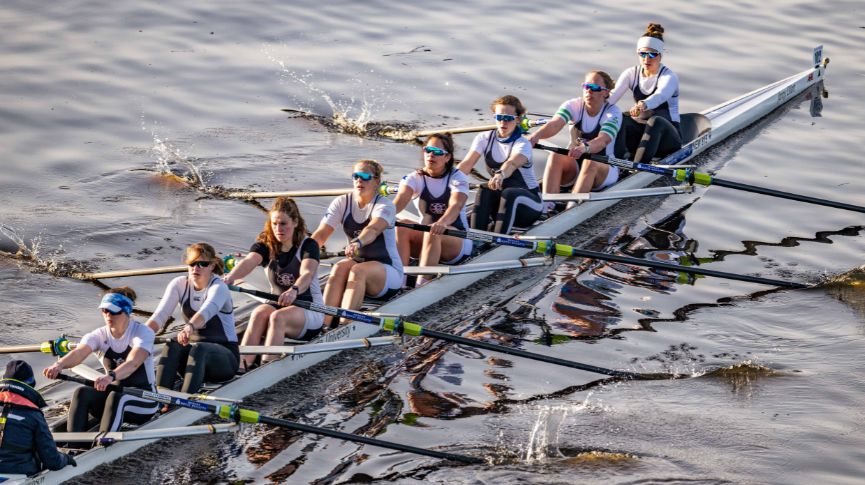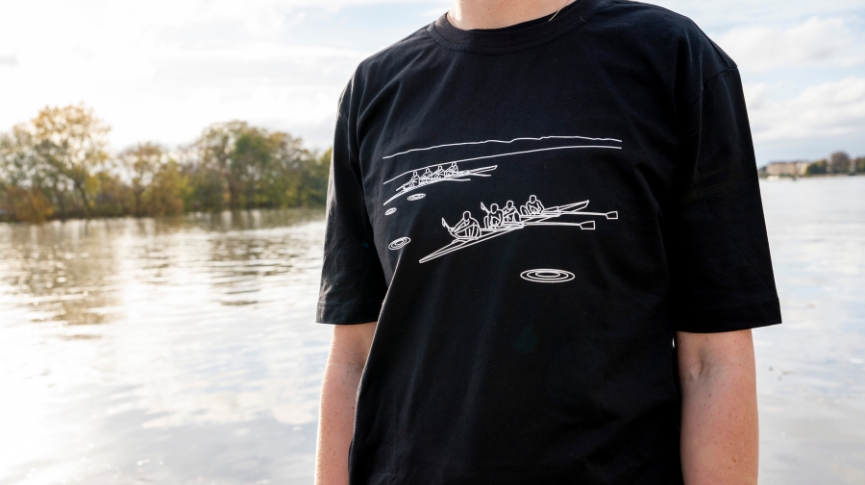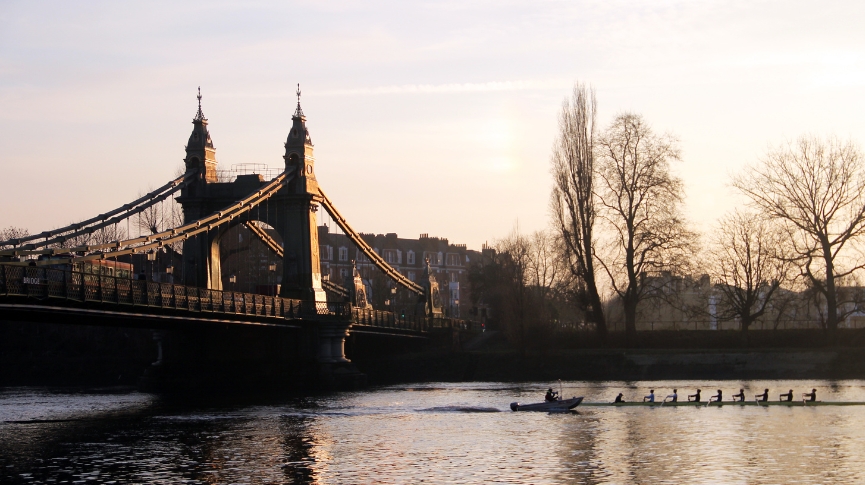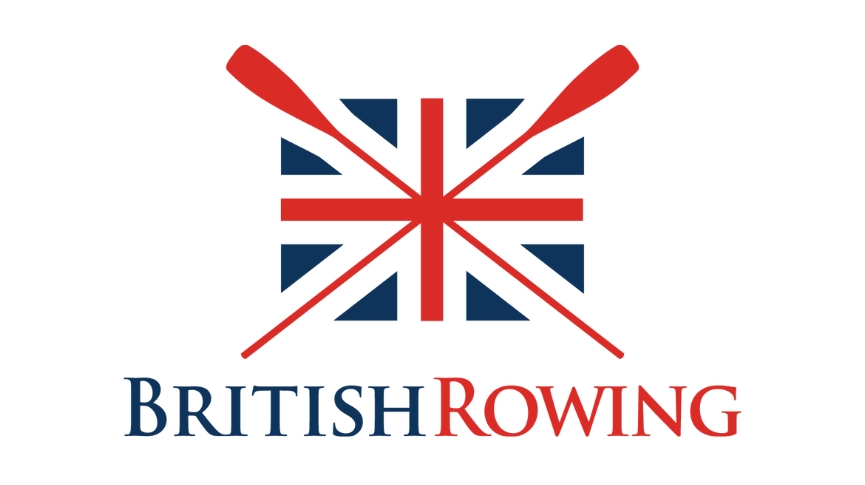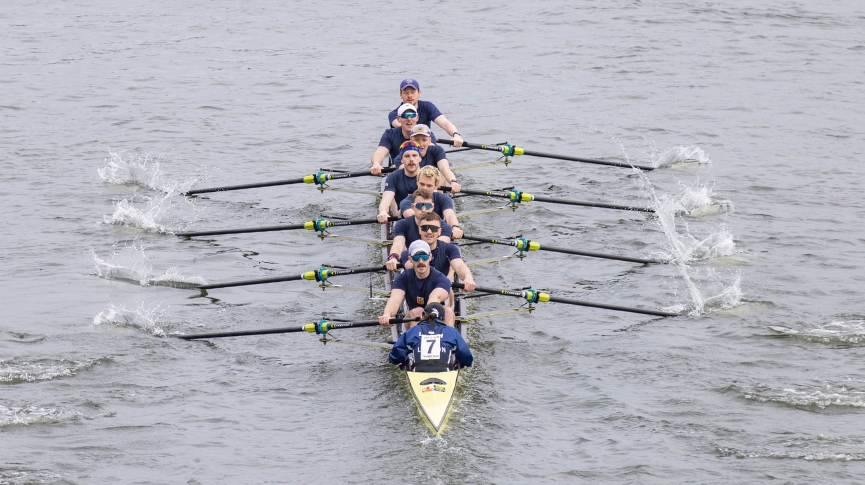How to win the Wingfield Sculls, as told by Imogen Grant and George Bourne
On The End of The Island Podcast, Fergus Mainland spoke with George Bourne and Imogen Grant to hear all about the trials and tribulations from the 2025 Wingfield Sculls
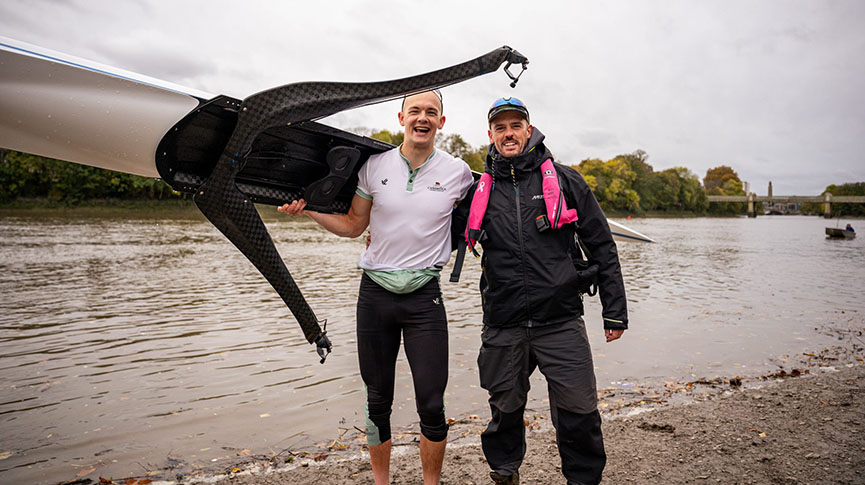
The Wingfield Sculls. Unpredictable. Erratic. Extraordinary. For nearly 200 years, this unique showdown on the Tideway has served up thrilling contests and produced a list of winners that includes some of the finest rowers this country has ever produced. Since its inception in 1830, fewer than 100 men have won the event, and after the women raced for the first time in 2007, only a dozen women have added their names to the trophy.
The 2025 edition was one of the sternest tests for competitors as six men and six women took to the water. After a gruelling slog from Putney to Chiswick, Dr Imogen Grant MBE emerged victorious for the fourth consecutive year, solidifying her status as the best woman to ever race the Wingfields. On his third attempt, George Bourne was triumphant, adding his name to the list of winners that includes Alan Campbell, Mahe Drysdale, Sir Steve Redgrave, and record holder Adam Freeman-Pask.
For George, preparations for this year’s race took place on the Windsor stretch of the Thames. The campaign was a reunion between him and one of his old coaches. The Cambridge and Durham graduate has been tutored by some of the best in the business, such as Rob Baker and Wingfield winner Wade Hall-Craggs, and for this year’s race, he called upon the experiences of Kieran Clark.
“I first worked with Kieran in 2018 when I was a spare,” explained George.
“He was running a quad for the U23 World Champs, and even though I was a spare, he was supportive, and he really started to help me develop my sculling, so it’s nice to continue working with him, and we slot back in pretty easily. He knows how I work, he knows when I’m panicking, and he knows how to put that sort of thing right.
“To take that onto the Tideway where he’s got so much experience at Tideway Scullers, he’s steered me at the Wingfields, Sam Meijer at the Wingfields, he’s steered Callum [Dixon] to wins at the Wingfields, I think it was epic for me. It was a huge part of why this was such an enjoyable couple of weeks for me was linking back up with him, particularly in the build-up; it was perfect to have him there to help me relearn how to scull a bit and shake off the dust and the cobwebs.”
And there were certainly cobwebs to be blown away. After winning gold in the Men’s Coxless Four in Shanghai, George has returned from holidays in Malaysia and had to readjust to sculling, having spent most the year in the sweep boats.
“I live about five minutes from where the guys train at The Windsor Boys’ School BC, and a lot of them were out at The Head of the Charles, so I had the river to myself, and it was perfectly flat. I had about a week to get back up and running in the single, and I did a couple of sessions to try and shock my body into that longer distance stuff.
“I did one piece actually where I tried to do a four-kilometre piece. I got three kilometres in and I was convinced I had weed on the fin. So, I did that thing where you get all angry, and I was like, ‘Flipping weed,’ and I was backing down and nothing came out,” he said with a laugh.
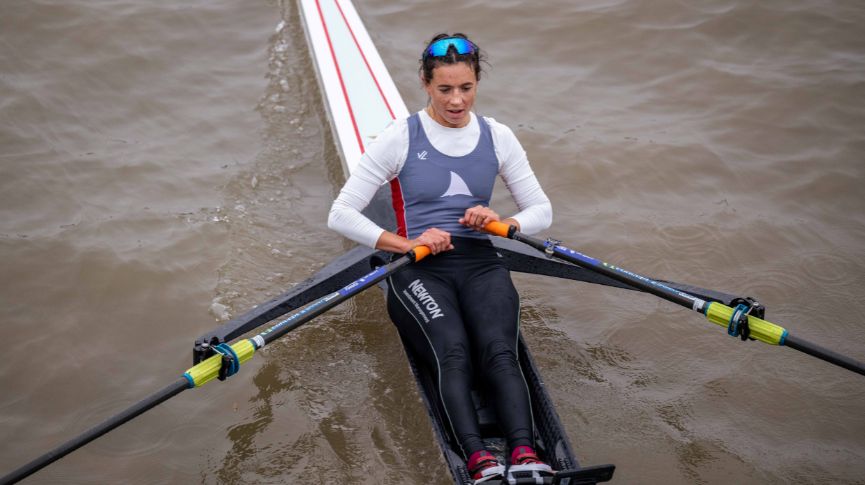 Credit: AllMarkOne
Credit: AllMarkOne
As well as their previous Wingfield escapades, Imogen and George were able to tap into their Boat Race knowledge. One can never truly master the Tideway, but prior experience can pay dividends.
As both scullers took to the water on Sunday, it became clear the Tideway gods had woken up and chosen anger.
“It was probably the roughest I’ve had it for the Wingfields,” said Imogen.
“This time of year, at least one of the Tideway races gets cancelled, and you can never trust that the weather is going to hold out particularly nicely. I’m not sure if we had the worst of it, or if the men had the worst of it or if there was more stream for the men’s race or whether we had it bouncier with the slightly higher tide, but it was a long old slog.
“My race warm up for the race itself consisted of one maybe 18 stroke burst at rate 28 down the line of buoys in Putney where I think I smacked my blade every single stroke in the chop where it was really rough at which point I decided, ‘Screw this,’ and paddled up to the start and decided that adrenaline will see me through and I’ll just deal with what comes. I was probably quite unprepared off the start, but at least I’d had a taste of the conditions.”
Despite six boats racing side-by-side in both the men’s and women’s races, there are no stakeboats, and there are no river closures. Under the watchful eye of umpire Greg Searle, himself a three-time winner of the Wingfields, the watermanship of all the scullers is put to the ultimate test.
As the mens race kicked off, it was a fight for the cleanest water right off the bat. “I was in the middle at the start, just on the Middlesex side. I had it in my head that it would be a bit flatter over at the Fulham wall. I made a point of shouting to Bryn Ellery on my left, and I was saying, ‘Bryn, go left!’ We both started to go left together and he shot out and went straight past me, shouting, ‘Bowball,’ off the start which was brilliant by the way. I thought it was so good. I didn’t have the confidence to shout it back when I went past him because I thought if I now mess this up, I look like a right idiot.
“I tried to push us a little towards the Fulham wall. Greg was shouting, ‘George and Bryn, come back to me,’ and I looked at Bryn and I said, ‘No chance.’ I wasn’t going to let him come back because I was sure it was going to be flatter over there. But honestly, my start was dreadful, and I was really struggling. Just out of fear, my first stroke was super short, and then I was all over the place with wet handles, and I actually had a moment where I sat at backstops and thought I needed to just reset and try again.
“I was a bit on the back foot, so by the time we all merged past Fulham Football Club, we were a bit spread out. Callum was leading, Matt Long was up with him, and Bryn on my left was pushing for the lead as well. Where I was, I had a bit of space and again, we didn’t clash, and the umpiring was fair, and everyone played fair.”
George’s experience out of the blocks is one that Imogen can relate to. In previous years, the Olympic champion has found herself down on some of her competitors, but this year was a slightly different affair.
“I decided to shorten my first stroke quite significantly as well, which is something we do in the Boat Race for slightly different reasons, but it gives you more stability and more ability to get onto the next stroke cleanly. Once we were aligned, I was middle of the pack. It’s difficult to align six boats, but everybody was very cooperative with that. I was pleasantly surprised because I shot out to at least level with people and ahead of a few others. It was very rough off the start, and it was about taking a decent number of strokes, but more importantly, just not catch blades and just be really clean with it.
“We started closing in towards each other quite early on,” said Imogen.
“There was a pack of five of us who were heading for the fastest water, as you should. I think it was a testament to the umpiring and the steers people that there was no contact between the boats. After that point, I felt pretty good, and I felt I could keep the rate pretty high and got out in front and was able to really slowly increase my lead, barring the two times where I crabbed and hit a massive log and nearly went in!”
In Eights racing, the air is filled with a cacophony of noise as blades crash into the water and the bellows of coxes boom around the course. In the single sculls, there couldn’t be more of a contrast. There’s an opportunity to hear the creaks of gates and the noises coming from competitors, allowing mind games to be played out. George took full advantage of this during his race, and Imogen was much the same.
View this post on Instagram
“I can be quite a gobby racer in the single. Yelling at someone else like that when it’s just you in the boat, you’re fighting for the water or anything, I feel like I’ve probably perfected my ‘MOVE’ as you’re rowing along to try and get your opponent to spook and move away.
“I just wanted to shout out Izzy Lancaster in our race. I don’t know what teammates she had, but there was someone on the bank shouting encouragement for her the entire way down the course. When you are in singles, that kind of noise, I was listening to it the entire way going, ‘My goodness, she’s still there, still racing me. This person on the bank is telling her that she’s still there and still going really well,’ I loved that level of posturing and communication between the rowers.”
Prizegiving at the Wingfields is quite a sentimental affair. The large Wingfield flag is unfolded, and binders are unveiled, bursting with newspaper cuttings and photos from more than 100 years ago. Ian Wingfield was also in attendance, representing the Wingfield family after his relative Henry Colsell Wingfield founded the event nearly 200 years ago, adding to the weight of history that comes with this event.
George said, “I was stupidly happy to win. When you’ve tried something and both times the race had just got the better of me, I’ve lost my head in the races, I sculled terribly, and everything I was thinking went out the window. I think that’s why it’s such a cool event.
“So much of rowing that we do is a test of who can go from A to B in a straight line faster than anyone else, and that’s cool. But this is a cool race in that it says the premise of the race is to find the best sculler, and interpreting that in a different way. There’s so much more to that race, which is partly experience, partly it’s keeping the head, and it’s partly luck
“To have the chance to do that and to win, no matter how good you get at sculling. I was really chuffed, and it’s such a prestigious event that I’ve had my eye on now since the first time I did it in 2019. It was really cool to finally have my name on that trophy.”
Imogen echoed the same feeling. “It’s not always the fastest person on paper who wins. I think what makes it so cool is that you’ve not just got to be the best on the day, but you’ve also got to have the guts to enter.
“It’s never an easy time of year. There are other commitments that people might have. It’s the start of winter training, trials for Great Britain is coming up, and that’s put some people off from entering. Genuinely, the only reason I’ve won it four years in a row is because I’ve had the guts to say, ‘Yep, I’ll do it again. Yep, I’ll do it again.’ I’ll turn up, and you can only race who turns up.”
Listen to the full conversation here.


